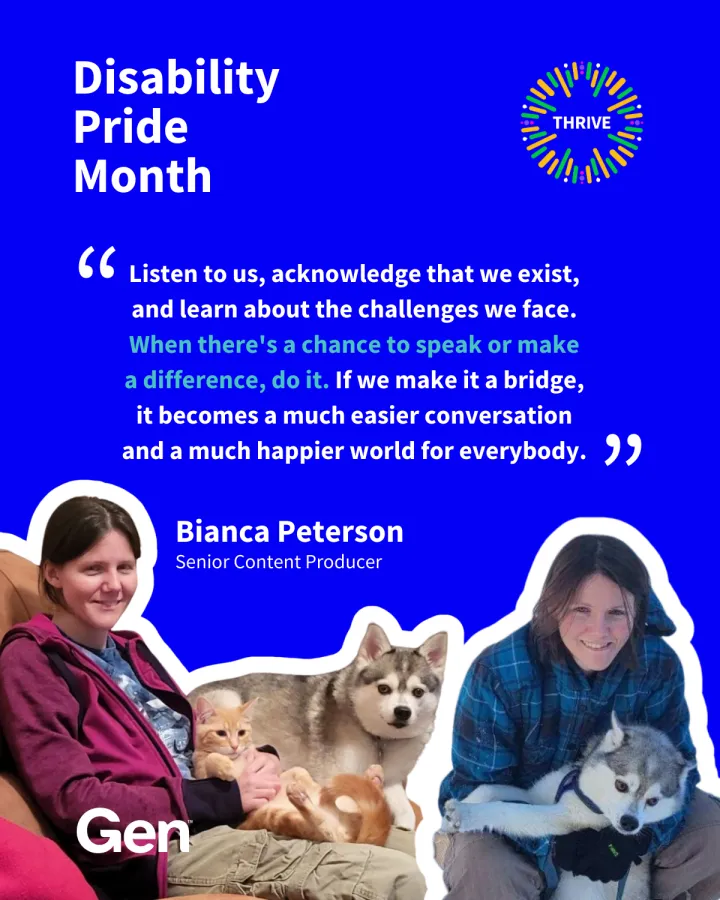Honoring Disability Pride Month With Our ERG


Bianca Peterson, Senior Content Producer at Gen, was diagnosed with rheumatoid arthritis when she was just four years old. She remembers her mom sharing brochures about the incurable disorder with her teachers to make them aware of her inflammatory symptoms.
It wasn’t easy. But she was grateful for the support system she had.
Years later, Bianca was diagnosed with anxiety, depression and ADHD – all of which are called “invisible disabilities.” The ones that you don’t necessarily see, but you can feel.
According to the CDC, over 25% of adults in the U.S. have a disability. Some seen, while others are not. That’s why it’s so important that we understand, consider and support both, not only at work but also in life.
Complexities of Managing Invisible Disabilities in the Workplace
“The anxiety and ADHD diagnoses were huge eye-openers for some of the struggles that I had both at school and at work and in my personal life. I went straight from college to a full-time job, and it was a big shift. I struggled with concentration, and it was super hard to stay focused on what I was doing,” said Bianca.
Bianca explained how her disabilities were sometimes debilitating, and underscored the importance of companies and managers making accommodations for people to thrive.
“Every disability is different, and every person is going to face unique challenges. If companies approach it from a ‘How can we make things as accessible as possible?’ standpoint, then they start covering basic needs,” said Bianca.

Prioritizing Inclusion: Embracing All Forms of Disability in the Workplace
Vision impairment. Hearing impairment. Autism. Physical disabilities. Or learning disabilities. They can come in many different forms. It’s important to not make assumptions or generalize based on appearance or diagnosis. Instead, Bianca encourages people to ask questions and to be open to learning and understanding.
Mental health conditions are also impairments and should not be overlooked, as there's a thin line between mental health and well-being, and the immense impact it has on workplace productivity.
"Don't push off mental health. Remember, the brain is an organ just like your heart and your kidneys are,” Bianca said.
Creating a mentally healthy workforce is more than a policy; it's about weaving compassion and understanding into the fabric of your company culture. For Gen employees, we offer an Employee Assistance Program available to our team and their families to address issues and situations that may negatively impact overall well-being.
A People-First Mindset
To help advocate for inclusivity and accessibility, Bianca became a champion of THRIVE, an employee resource group at Gen that dedicates its efforts to advising, educating and assisting people on how to be inclusive of those with disabilities. This includes strategies for recruitment, retention and advancement of people with all types of disabilities.
To help other employees gain awareness, she talks about putting people first.
‘People-first language’ is the idea of prioritizing the individual over their diagnosis, ensuring that the person comes before their condition. Since preferences for language can vary among communities, staying informed about these standards is crucial. Here are some examples of phrases to avoid:
- "They suffer with this disability" – Instead, say "They live with this disability."
- "The disabled person" – Opt for "the person with a disability."
- "The person with mental illness" – Say "the person living with a mental health condition."
No disability can restrict the capabilities of a determined person. At Gen, we’re committed to fostering an inclusive and supportive environment where every employee can thrive. Our journey of learning and improving never stops, as we continuously strive to be a better company for all our employees. By embracing diversity and prioritizing accessibility, we aim to create a workplace where everyone feels valued and empowered to succeed.
If you’re interested in learning more about Disability Pride Month, visit UserWay.org.